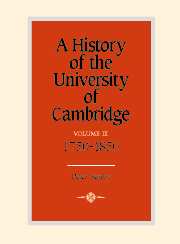Book contents
- Frontmatter
- Contents
- List of illustrations
- General Editor's preface
- Acknowledgements
- List of abbreviations
- Introduction
- 1 Townscape and university: topographical change
- 2 The university: its constitution, personnel, and tasks
- 3 Colleges: buildings, masters, and fellows
- 4 Colleges: tutors, bursars, and money
- 5 Mathematics, law, and medicine
- 6 Science and other studies
- 7 Religion in the university: its rituals and significance
- 8 The Orthodox and Latitudinarian traditions, 1700–1800
- 9 Cambridge religion 1780–1840: Evangelicalism
- 10 Cambridge religion: the mid-Victorian years
- 11 The university as a political institution, 1750–1815
- 12 The background to university reform, 1830–1850
- 13 Cambridge and reform, 1815–1870
- 14 The Graham Commission and its aftermath
- 15 The undergraduate experience, I: Philip Yorke and the Wordsworths
- 16 The undergraduate experience, II: Charles Astor Bristed and William Everett
- 17 The undergraduate experience, III: William Thomson
- 18 Games for gownsmen: walking, athletics, boating, and ball games
- 19 Leisure for town and gown: music, debating, and drama
- Appendices
- Bibliography
- Index
17 - The undergraduate experience, III: William Thomson
Published online by Cambridge University Press: 05 April 2012
- Frontmatter
- Contents
- List of illustrations
- General Editor's preface
- Acknowledgements
- List of abbreviations
- Introduction
- 1 Townscape and university: topographical change
- 2 The university: its constitution, personnel, and tasks
- 3 Colleges: buildings, masters, and fellows
- 4 Colleges: tutors, bursars, and money
- 5 Mathematics, law, and medicine
- 6 Science and other studies
- 7 Religion in the university: its rituals and significance
- 8 The Orthodox and Latitudinarian traditions, 1700–1800
- 9 Cambridge religion 1780–1840: Evangelicalism
- 10 Cambridge religion: the mid-Victorian years
- 11 The university as a political institution, 1750–1815
- 12 The background to university reform, 1830–1850
- 13 Cambridge and reform, 1815–1870
- 14 The Graham Commission and its aftermath
- 15 The undergraduate experience, I: Philip Yorke and the Wordsworths
- 16 The undergraduate experience, II: Charles Astor Bristed and William Everett
- 17 The undergraduate experience, III: William Thomson
- 18 Games for gownsmen: walking, athletics, boating, and ball games
- 19 Leisure for town and gown: music, debating, and drama
- Appendices
- Bibliography
- Index
Summary
WILLIAM THOMSON BEFORE CAMBRIDGE
To thought and feelings seas and continents present no barriers … They roam at will to the uttermost parts of the earth. Though to those around me I appear to be seated in our little parlour at Knock beside a blazing fire before which three apples are roasting and diffusing an agreable fragrance around … in spirit I am with you in your solitary study, looking over your shoulder while you are unravelling the mazy intricacies of a mathematical problem. There you sit all absorbed, deep thought broods upon your brow. Now you pause and look with earnest eyes at the vacant wall, and now with sudden inspiration you turn to commit the happy thought to paper which lies before you. Your fire is almost out, your candle is unsnuffed, your once hot tea stands untasted before you on your table.
So in October 1842 wrote Elizabeth Thomson, aged twenty-four, to her brother William, aged eighteen, an undergraduate in Peterhouse. The letter reveals the intelligence and sensitivity characteristic of the family, and the close affection that bound its members together; it helps to explain the soaring trajectory of William's career at Cambridge and after. He was to become a famous scientist, and Lord Kelvin. There were six siblings, two girls and four boys. Their mother, Margaret, died in 1830, when William was six. Their father, James, came from humble Ulster Presbyterian stock. At first largely self-educated, he proceeded like so many Ulstermen to Glasgow University; and after teaching at the Belfast Academical Institution he became Professor of Mathematics at Glasgow in 1832.
- Type
- Chapter
- Information
- A History of the University of Cambridge , pp. 613 - 640Publisher: Cambridge University PressPrint publication year: 1997



